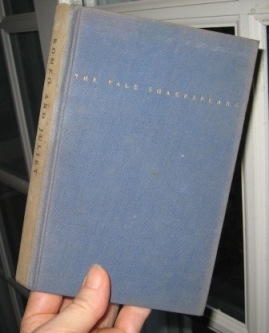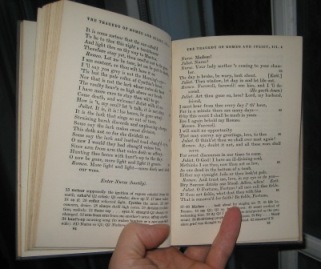Having watched West Side Story a few weeks ago, I came down with a severe relapse of the Shakespeare bug and so last night sat down and re-read Romeo and Juliet. I wanted to see how closely the movie followed the play.
Answer: yep, very closely. I’m sure this has all been written out before, so I won’t turn this post into an OMG!!! sophomorish comparative lit paper (at least not on that topic, heh) but suffice to say that about the only major differences were in the whole fake-my-death-in-a-doomed-ploy-to-be-reunited-with-my-lover device.
If you’re a lit nerd like me, it is kind of fun to enjoy the two side by side — to see how famous dialogue like “a rose by any other name” is handled in the musical. Try it, and do enjoy ;-)
Another thing struck me as I mulled the play, however.
This has probably been remarked before too but I’m going to work it out for myself anyway.
I published a post some time ago about how, in rereading Anna Karenina as a nominally-mature adult, I found it to be a different book than I once thought. It isn’t a starry-eyed celebration of doomed love — it’s a condemnation of weak character. Anna’s a deeply flawed individual, not a one-dimensional victim of social repression.
I had a similar reaction last night to Romeo & Juliet. The first tip-off was something I’d completely forgotten: that when we first meet Romeo, he’s a complete mess over another woman, fair Rosaline.
Huh?
The man has, apparently, been pining away for some time because Rosie doesn’t love him back — spending every night wandering around outdoors, weeping & sighing, and then shutting himself inside all day with the curtains drawn to make himself “an artificial night.”
Then, after spending an entire day insisting that he’ll never get over her, he meets Juliet — and within about a nanosecond is as smitten for her as he ever was for Rose.
I found that odd. What sort of true-hearted hero is this, Bill? Whose heart can veer so suddenly and violently (and unselfconsciously!) from one love to another?
Of course Shakespeare renders the love between Romeo and Juliet a beautiful thing. Heart-wrenchingly beautiful. Clearly he means to hold it up as a romantic ideal of sorts.
But there’s another critical layer to the story that I noticed after a bit: the consequences of the lovers’ extraordinary passion are every bit as destructive as the passionate “choler” that erupts whenever lesser members of the Montague and Capulet families run into each other in the street.
It seems to me Shakespeare creates an obvious parallel between the two. Romeo and Juliet never try to temper their passion with anything like common sense, let alone reason. They marry the day after they meet, for crying out loud — and in Act III Scene 3, after Romeo is banished from Verona by the prince for murdering Tybalt, it’s only the Friar’s scolding that stops Romeo from killing himself:
Art thou a man? thy form cries out thou art —
Thy tears are wom’nish, thy wild acts denote
Th’ unreasonable fury of a beat.
Unseemly woman in a seeming man,
And ill-beseeming beast in seeming both,
Thou hast amaz’d me.
Get ahold of yourself, you ninny. The Prince has spared your life. You can bide your time and be reunited with Juliet by and by. It ain’t the end of the world.
Romeo calms down, but of course it’s only a prelude to yet another slew of rash acts that culminates with the final bloodbath.
It’s a marvelous thing, then, the way Shakespeare handles the first murder in the play. Do you remember it? There’s a street brawl, and Tybalt stabs Mercutio. But what’s interesting is that Tybalt does so by using Romeo’s body to hide from Mercutio the fatal thrust of his rapier.
Romeo he cries aloud,
‘Hold friends! Friends, part!; and swifter than his tongue
His agile arm beats down their fatal points
And ‘twixt them rushes; underneath show arm
An envious thrust from Tybalt hit the life
Of stout Mercutio . . .
This layer isn’t brought out in the same way in West Side Story. WSS is played, first of all, as a straight “star-crossed lovers” story — Tony has matured, he’s not hanging out on the streets any more, he’s got a job — but then he’s drawn back into the gangs’ fighting by his love for Maria, becoming a victim of the violent subculture he’d tried to leave behind.
And, in keeping with that trajectory, the circumstances of the first murder are subtly different: Tony holds Riff back from stabbing Bernardo, and Bernardo takes advantage of that to stab Riff.
It’s a subtle difference but a telling one. Tony is playing pacifist, physically restraining Riff. Romeo is also trying to break up a fight, but he functions as an unwitting screen behind from which comes the deadly thrust.
“Why the devil came you between us?” Mercutio asks Romeo before he dies. “I was hurt under your arm.”
Romeo’s read of the situation was naive –just as was Tony’s — and on the level of pure plot, that’s why the story turns tragic.
But in the Shakespeare, Romeo’s arm cloaks Tybalt’s — they become in that moment the same arm. So it isn’t just the street brawlers who are in the words of the Prince (Reason and Justice) “enemies to peace” . . .
Incidentally, if your library lacks a collected works of Shakespeare, I highly recommend you look for the marvelous but sadly out-of-print edition, The Yale Shakespeare
The beauty of it: it’s broken into 40 slim volumes. Here’s my Romeo and Juliet.

It’s 4X7 inches — light enough to hold open with one hand.

I have no idea if it’s considered up-to-par today from a scholarly perspective (my edition was published in 1954; the original came out in 1917) but it’s annotated to help with the more archaic bits.
And from an ease-of-use standpoint, it’s pure genius. When publishers shove Shakespeare’s complete works into a single volume, you end up with a book that is hugely unwieldy (and with paper that is thin as tissue to try to keep the weight down). Who wants to lug a 20 pound doorstopper around when all you want to do is read R&J while you’re parked in the dentist’s waiting room?
The Yale Shakespeare is kind of pricey (link above to Amazon has a couple sellers offering the complete set for $75 as of right now) but it’s well worth it, in my opinion.
Would be nice to see a re-issue. Wonder if it could be done for under $75 . . .


